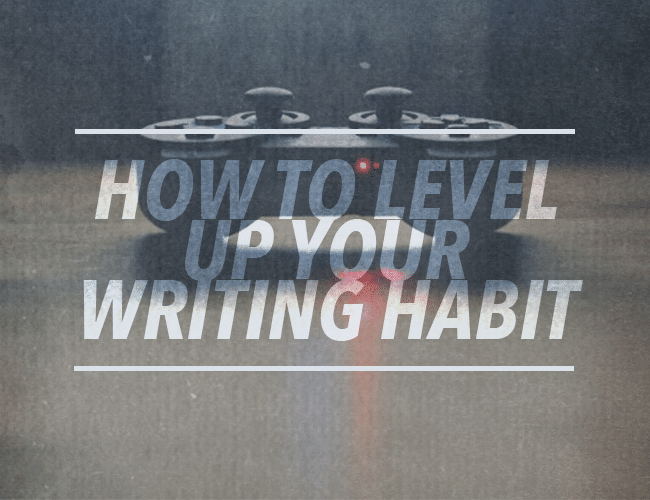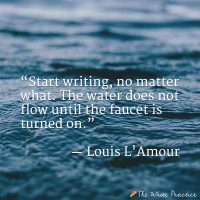NaNoWriMo demands a sudden burst of high-capacity creation—it’s like sprinting a marathon. This works for some people, but if you’re not one of them, don’t feel bad. Try leveling up your writing habit instead.

Why you should level up your writing habit
NaNoWriMo can be great for some writers. After all, it’s only thirty days, so the pressure of the countdown is looming, and for many, this is a reasonably short period of time to let other things fall to the wayside and focus solely on their word count.
This kind of leap in creative output is a lot to demand of yourself, and it's not always a sustainable way to create a writing habit, or really any behavior that you want to maintain long-term.
If you’re looking to boost your word count for the long-term, try leveling up instead.
What does leveling up your writing habit mean?
“Leveling up” is a habit-changing method created by Leo Babauta of Zen Habits. He broke down leveling up to show how he worked his way to a healthier lifestyle.
Like a video game, the way to changing your health habits is by starting out at the first level, and only going to the next level after you’ve beaten the one before that. The problem is that most people start at Level 10 and fail, and wonder what happened. Most of us want to skip several levels, but we’re just not ready.
Though Babauta was leveling up his health habits, it’s a great way to work up to any kind of goal.
“Leveling up” means using small, gradual steps to work toward your goals. For example, if you want to start a daily writing habit, you don’t begin by trying to wake up at four a.m. and keep yourself in front of the computer for two full hours.
Instead, you start with a writing habit so ridiculously easy you can’t fail—like five minutes a day. If five minutes may fall wildly short of your ultimate goal, that’s okay. It’s still a good thirty-five minutes a week of writing that you that weren’t doing before, and more importantly, it sets the stage for even more writing each day later, when you level up.
As Babauta says, “Please, for goodness sake, don’t make the mistake of skipping this level because it sounds too easy. The easy levels are where you gain your skills.”
So stick it out and take it seriously. Because here’s what happens next: After a few weeks, you will reach a point where those five minutes a day are comfortable and easy, almost automatic. And then, hooray, you’re ready to level up. You bump up your daily writing time ten minutes day. And then fifteen. Then thirty.
And suddenly—(or, not suddenly, but rather incrementally, slowly, deliberately)—look at you, you writing pro, you’re tapping it out on your computer for a good hour every single day. Major props, you.
Why it works
Nothing is as powerful as habit for reaching long-term goals.
Think about it: What if you could know for certain that you were going to get at least a little writing done every single day? What if you did it automatically, without the mental whining or procrastination? What would that mean for your writing?
It would mean doing a lot more of it, that’s what (and doing more writing is the proven key to writing better).
The key behind Baubuta’s super-smart approach is that you create the habit slowly in steps so small they’re painless. His model prioritizes the sustainability of the habit over any individual day’s progress.
Ready to level up your writing habit
So now that it’s clear why you should level up your writing and how to do it, the only question left is, what’s your writing goal?
Whatever it is, break it down into its smallest pieces and find a starting point—a step toward your goal that is so painless you can’t fail. Then, stick with it and build from that habit. Over time, you’ll reach your goals—and get a ton of extra writing done along the way.
What about you? Which sounds better: writing a book in a month or leveling up your writing habit? Let me know in the comments.
PRACTICE
Why not start your new habit today? Grab a piece of paper and write your work-in-progress for just five minutes. How’d it go?
When your time is up, share your piece in the comments!







This sounds awesome. I shall have to try and give it a shot once I have finished NaNoWriMo.
This is great Emily, thank you! This is my freshman year attempting NaNo and it’s a huge task for anyone to write 50,000 words in 30 days. So as a minor concession to my newbie status, I began the month already having a few chapters of my draft written. While some might see that as maybe not in the spirit of NaNo, the main challenge for me is to see how close I can get to completing the draft within the month. If that means I get to 50,000 words, great! If I can exceed them and then discount those head start chapters, even better! Right now, all in, I’m just over 38,000 words, so I’m on the way there
It does sound a good idea. As to NaNo, I’m going to fall this year. Everything has ganged up against me.
I don’t like feeling pressured about deadlines so this helps tremendously. I like thinking of getting there gradually. It is good to take the time so that we can think better and clearer about writing. Thank you.
My only successfully written book is
just over 10, 000 words and was written in 2010. It has been in the market
since then. It, however, falls outside the bounds of literature.
In 2014, I started a memoir, reached
about 15, 000 words and stopped, waiting to witness and event that is featured
in the abandoned memoir: I wanted details about the event. I missed the day of the event in my village at
the beginning of April last year. I am waiting for another April, but I guess
that is just an excuse, as I could go on to write other modules while I wait
for the zarachi festival to cycle
round in April. That was just how the memoir got stalled. I hope to continue
with it, nevertheless.
Prior to giving that memoir a shot, I
had written literary fiction and non-fiction in short formats not exceeding
6000 words. Three weeks ago, I started expanding one of my short stories into a
novel. Just a few minutes ago, I went past 11, 000 words. My target is 65, 000
words. When I started it, I was going on a target of a 1000 words per day, but I
missed a number of days. Today, I resumed writing it. I want to write as much as
my energy permits, each day. Something tells me this one would knock on the
door of a publisher, perhaps in two or three months. But, I also need a guide
who would check the story and tell me if he thinks I am moving along the right
bearing.
Thanks for the constant posts from
which one learns so much.
Good thoughts. My mind went to SuperMario64, probably because that’s the only video game that I played as a child. In it there are “worlds” that you get to though different portals in Bowsers castle. In each world you get tasks to complete (return the baby penguin to it’s mother, fight the Big Bomb) and when you complete one successfully you get a star. It takes a certain amount of stars to open up new portals in the castle. And each new portal is harder, more complex, and more fun than the last. I think that you could also look at writing that way.
I’m glad to say that I’ve been keeping up with my NaNoWriMo novel, despite being swamped with a billion other things. It wasn’t always steady in how many words I could write a day and there were many times I got up extra early or stayed up late. But that’s life. Today I reached 39,000 words. Hoping to reach 40,000 by the end of the day.
Ok, Emily, five minutes on Dark Star Passing. Thanks. I think this is a beginning. It needs to be fleshed out to fit between two elements I’ve posted on the Workshop, but it is further than I have gotten.
The Foundation.
What do you call the organization that is responsible for saving the human race? Hell, not what to call it, how to unite all races, all geographical areas, every ten toed bi-ped on a planet that has been squabbling and fighting over how many angels, or whose angels, were on the head of a pin for over 6,000 years. How do you even get their attention?
Getting their attention is easy. Throw something really really big at them. Aramis did that. Aramis got their attention in a way that not any tyrant had been able to in all of those mellienia.
After the announcement from the Lunar Farside Array, the Big Eye in Jovian orbit confirmed it and codified the passing date, and confirmed the results. Yes, Neptune would be pulled out of orbit, but it would plunge into the inner system and would indeed capture the Earth/Moon system. Fact, folks, inarguable. Earth was going on a very long journey.
The fundamentalist, of course went berserk. Rapture! End of mankind! Prepare for the second coming! Hell fire is on it’s way! Come to Jesus!
This is something I would like to experiment especially once I go back to work and will have to “fight” for my time. Viewing writing or any habit you want to form as a sort of video game can be motivation enough. For me, I would add a way to “check in” to the habit, like the app Coach.me because it’s also motivating to see my streaks (this adds more of a game element in my opinion). There are other simpler ways to do this such as Seinfield’s method of don’t break the chain of X’s on his calendar in order to form his habits.
Another thing to address is politely saying to others that this time is your time even when NaNoWriMo is over. I think it’s easier to hide behind the event and tell loved ones “it’s only for a month” where they can shirk their normal responsibilities to dedicate to writing.
What do you do when you don’t avoid writing because you’re a feckless poseur?
What do you do when you avoid writing because it is all that you are?
I’ve participated in NaNoWriMo a few times now, and I’m on pace to win it this year. It’s been a wonderful feeling, successfully writing every day this month, but I’m all too aware that the habit will drop off on December 1. I’ll be looking to level up my daily writing habit instead once NaNo is done this year.
Five minutes worth of writing:
Hannah’s hair looks fiery in the sunlight, and suddenly I want to dye my hair.
It definitely contrasts with Poppy’s long brown hair, and her shiny blonde highlights.
I notice that they’re walking like me and Reagan, arms linked, bodies close.
“How do you know where Crescent Beach is, know-it-all?” Riley pipes up, spiking my interest.
He’s walking closely between Sam and Lucas, so I figure that the three of them must be close.
Hannah turns around and scowls at Riley, “Why wouldn’t I know where it is, Riles?”
I almost giggle at their little exchange, watching them with a smile of intrigue.
I see his shoulders raise, “Han, don’t call me that, I hate that name,” Riley’s head shakes.
This time Poppy turns around, mirroring her best friend. Poppy flashes a bright smile at Riley and gets a laugh from him, while Hannah still scowls.
“Hannah’s first date was at Crescent Beach…” Poppy states, and she giggles when Hannah hits her lightly on the arm, hissing “Shut up…” before turning forward with a dramatic hair flick of her red locks.
This gets another giggle from Poppy and then she twists her body back around to join Hannah, and I see her arm reach to hold Hannah’s waist, and their heads turn inwards to each other in the sweetest way. It makes me smile, how you can tell they both really love each other, even in between the fights.
My eyes flicker back to Riley then, and he whispers to Lucas and Sam, “Guys, it must have been a f***ing bad date. Don’t mention it. I wanna stay alive tonight,” earning a snigger from Sam and a small smile from Lucas that I see as he turns his head to look at them both.
“That goes for you too, girls,” Riley mutters in a smooth voice, turning around with a dazzling grin, “Hannah can be a bit sensitive. Sssh.” He puts a finger to his mouth and presses his lips to it, and suddenly my temperature spikes and my eyes go wide.
We keep walking, us girls huddled together in our pairs, separated by the guys walking together in the manly way that they do.
Except Lucas. The way he walks is more careful, constructed. It’s endearing and sweet.
Then I wonder what it is that he has in common with Riley and Sam. Not that I know them enough yet to be able to ask this question to myself, but I am, because it’s clear that he’s different from them.
Hannah and Poppy giggle excitedly to each other and I take in my surroundings with a wide gasp, clinging onto Reagan’s arm.
— Not my best writing, but I just let the words flow without being overly critical.
Brilliant article. I’ve been trying to do this for a while now, just five minutes and sometimes it takes you to thirty minutes.